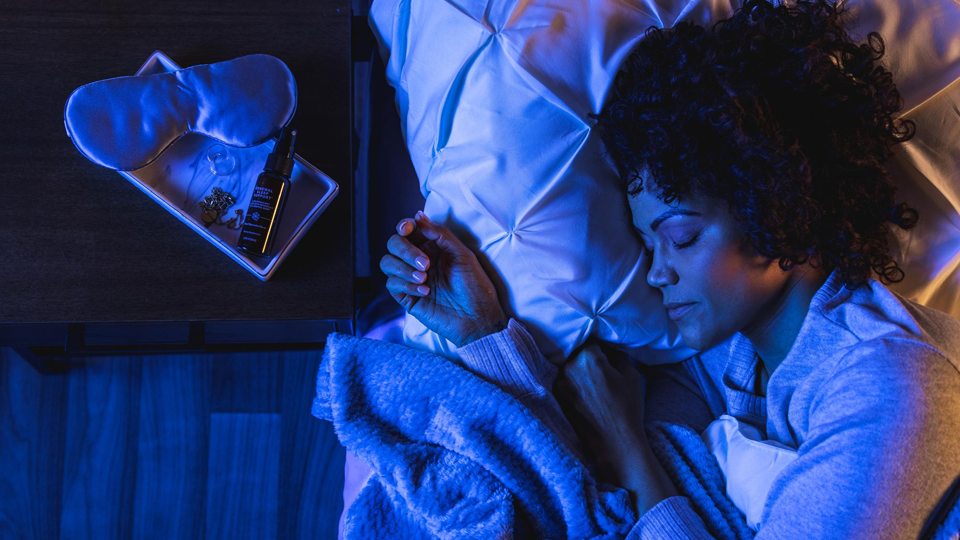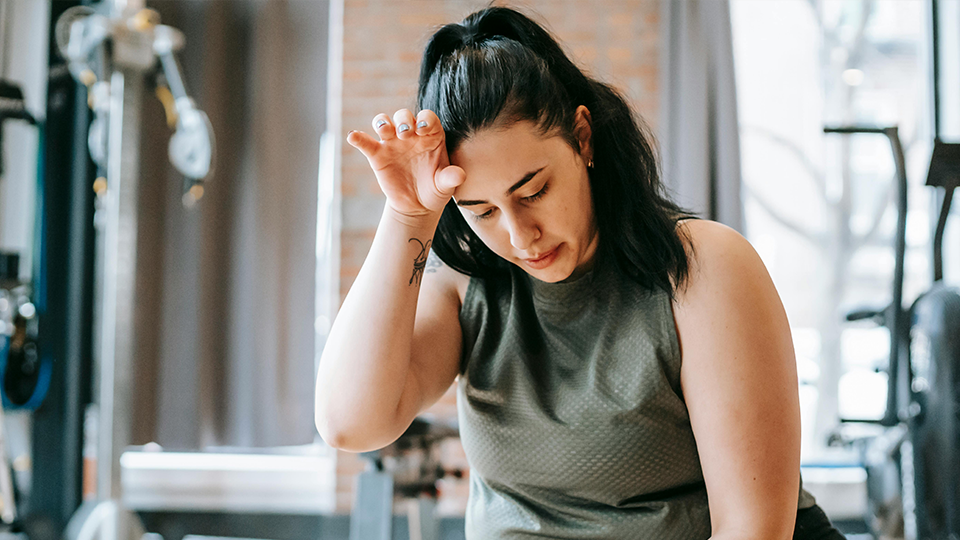Did you know that the average adult needs 7 to 9 hours of good quality sleep each night? But getting enough hours isn’t the only part that matters — sleep quality is just as important. While everyone’s sleep needs are different, it’s clear that women have unique sleep requirements that aren’t always being met. Making sleep a priority can support energy, mood, and overall health.
Sleep Differences by Gender
On average, women tend to sleep slightly more than men, but there’s more to the story:
- Studies show women usually sleep about 11–13 minutes longer per night than men.1
- Women also tend to have better sleep quality, with more deep (slow-wave) sleep and longer total sleep time.
- Despite sleeping longer, women often report more sleep disturbances. This occurs especially during life stages like menstruation, pregnancy, or menopause due to hormonal changes, night sweats, or insomnia.
Mental health has a big impact on sleep quality as well. Stress, anxiety, and depression can make it harder to fall asleep and stay asleep, leading to restless nights and daytime fatigue.
On the other hand, poor sleep can worsen mood, increase stress, and affect overall mental wellbeing, creating a cycle that can be hard to break. Prioritizing both mental health and healthy sleep habits can help improve both your rest and your emotional resilience.
The Effect of Hormones on Sleep
Hormone changes happen at many points in a woman’s life — during the menstrual cycle, pregnancy, and throughout the stages of menopause. These hormonal shifts can affect not only mood and energy but also sleep patterns, making it harder to fall asleep or stay asleep. Let’s take a closer look at how sleep needs and challenges change across different life stages, and how poor sleep can impact overall health and wellbeing.
Sleep and the Menstrual Cycle
A female’s menstrual cycle may involve a drop in estrogen and progesterone which may cause insomnia, restless sleep, excessive fatigue, and overall bad sleep quality. Additionally, physical pain from symptoms or cramps may contribute to bad sleep. Specifically during the luteal phase (the week before a woman’s period) and during menstruation, regular sleep needs may not be met.
Sleep and Pregnancy
Hormonal fluctuations during pregnancy can significantly disrupt sleep patterns. As pregnancy progresses, the prevalence of poor sleep quality increases: approximately 34% of women experience poor sleep in the first trimester, 46% in the third trimester, and up to 71% during the postpartum period.2
In addition to hormonal changes, physical discomforts such as back pain and the growing uterus can contribute to sleep disturbances. A common condition affecting sleep during pregnancy is Restless Legs Syndrome (RLS), which affects approximately 20% of pregnant women.2
Maintaining a regular sleep schedule and prioritizing sleep hygiene are essential for both maternal and fetal health. Implementing strategies such as using supportive pillows, practicing relaxation techniques, and avoiding caffeine and heavy meals before bedtime can help improve sleep quality during pregnancy.
Sleep and Menopause
Hormonal changes during menopause can significantly disrupt sleep patterns. Approximately 40–69% of women experience sleep disturbances during the menopause transition, including difficulty falling asleep, staying asleep, and waking up too early. 3 These disruptions are often linked to hormonal fluctuations, particularly decreased estrogen levels, which can affect the body’s temperature regulation and circadian rhythms.
Common sleep issues during this period include hot flashes, night sweats, and mood disturbances, all of which can contribute to fragmented sleep. Additionally, postmenopausal women are two to three times more likely to develop sleep apnea compared to premenopausal women, partly due to changes in airway muscle tone and weight gain.
Maintaining good sleep hygiene becomes increasingly important during menopause. Establishing a regular sleep schedule, creating a cool and comfortable sleep environment, and avoiding stimulants like caffeine and alcohol before bedtime can help improve sleep quality.
During this time in a woman’s life, menopause-specific products like Harmonia may be beneficial in supporting restful sleep as well as navigating other menopause symptoms.† By naturally supporting your body’s response to hormonal shifts and helping to reduce hot flashes and night sweats, Harmonia can lead to nights of great sleep even in menopause.†
Harmonia’s clinically studied formula helps support your body’s ability to manage:†
- Hot Flashes
- Night Sweats
- Sleep Quality
- Stress
- Mood Swings and Irritability
- Vaginal Health and Dryness
- Sexual Health and Urinary Wellness
Sleep and Stress
During periods of high stress, women may need even more sleep to feel energized and maintain physical and mental wellness. This can be hard as stress can often lead to tension in the body and racing thoughts which make it harder to sleep. Stress may also elevate cortisol levels and disrupt a sleep/wake cycle.
How Isagenix Can Help:
- Adaptogen Elixir is a convenient, on-the-go kombucha black tea with adaptogens and botanicals to help manage stress, support mental clarity, and promote relaxation and better sleep.†
- Renewal Sleep Support™ is a fast-acting oral melatonin sleep spray, enriched with tart cherry, valerian root, chamomile, L-theanine, and a refreshing spearmint flavor. It helps support restful sleep, realign your body’s natural sleep cycle, and relieve jet lag.†
- Get both products in the Sleep Better Bundle! This bundle provides you with a 30-day supply of both products.
Getting the Most Out of Your Sleep
Staying aware of your varying sleep needs over time is the first step in ensuring you are getting good quality rest in all life stages. But there are many things everyone can do to sleep well continuously:
- Create a sleep-friendly routine: Limit screen time before bed, keep your bedroom cool and dark, and make sure your mattress and pillows provide proper support.
- Make a sleep schedule: Going to sleep and waking up at similar times each day can make sure you have a regulated circadian rhythm. Circadian rhythm is your body’s natural 24-hour internal clock that regulates sleep, wakefulness, and many other biological processes. It tells your body when to feel alert and when to feel sleepy, based largely on exposure to light and darkness.
- Exercise: Physical activity can help you sleep more deeply at night, and spending time outside in natural daylight helps keep your body’s internal clock on track.
- Take supplements: Natural supplements like Harmonia (for menopausal women) and Renewal Sleep Support (for any adult) are great ways to help with your sleep quality.
- Cut out stimulants: Alcohol and caffeine late in the day can make it hard to fall asleep and even harder to stay asleep.
- Eliminate late night snacking: It can be tempting to enjoy a sweet treat or snack before bed, but eating before bed can make it harder to fall and stay asleep.
Instead, replace your late-night chocolate bar or bowl of ice cream with Bedtime Belly Buster, a nutritious night-time drink combining Tri-Release Protein Powder and GreensTM to satisfy your cravings and even release stubborn belly fat while you sleep.†
In Summary
As women age, sleep needs and patterns naturally change due to hormonal shifts, lifestyle factors, and health conditions. Understanding these changes and prioritizing good sleep hygiene such as maintaining a consistent schedule, creating a comfortable sleep environment, and managing stress can make a significant difference in overall wellbeing.
By recognizing and addressing these evolving sleep needs, women can support their physical health, mental clarity, and energy levels, ensuring better rest and a higher quality of life at every stage.
† This statement has not been evaluated by the Food and Drug Administration. This product is not intended to diagnose, treat, cure, or prevent any disease.
††Transparency and accuracy are a top priority at Isagenix. We constantly strive to ensure that product information is complete, accurate, and current. The facts panels displayed on our website are for convenience and the actual product and supplement or nutrition facts may vary slightly due to the availability of ingredients or changes to the manufacturing process. Please review the facts panel included on the label for each product received to ensure the product meets your dietary and supplementation needs.
References:
- Vahratian A. Sleep Duration and Quality Among Women Aged 40–59, by Menopausal Status. CDC National Center for Health Statistics. September 2017.
- Na M, Shetty S, Niu X, Hinkle S, Zhang C, Gao X. Sleep duration, napping behaviors and restless legs syndrome during pregnancy and the trajectories of ultrasonographic measures of fetal growth: Findings from the NICHD Fetal Growth Studies–Singletons. Science Digest. August 2024.
- Maki P, Panay N, Simon J. Sleep disturbance associated with the menopause. Menopause – The Journal of The Menopause Society. August 2024.





